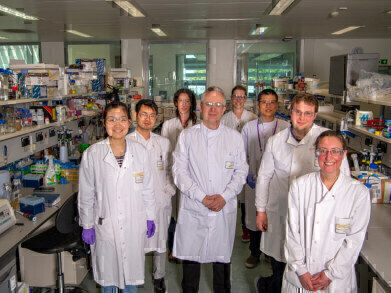-
 Professor Richard Henderson, University of Cambridge. Photo credit: MRC-LMB
Professor Richard Henderson, University of Cambridge. Photo credit: MRC-LMB -
 Prof James Naismith and team Credit: The Rosalind Franklin Institute
Prof James Naismith and team Credit: The Rosalind Franklin Institute
News & Views
Institute Commits to Funding a Low Energy CryoEM DEtector
Mar 24 2020
A development project for a multi-million pound technology which enables a more accessible form of electron cryo-microscopy is to be supported by The Rosalind Franklin Institute. The project is part of a new initiative in collaboration with Nobel prize winner and cryoEM pioneer Dr Richard Henderson and his colleague Dr Chris Russo, both from the MRC Laboratory of Molecular Biology (MRC LMB) in Cambridge.
The goal is to develop a detector which can work at a much lower energy, 100 keV, versus the current industry standard 300 keV, to obtain atomic scale images of biological samples. Crucially, the new detector will produce better data from the lower energy, 100 keV microscope than existing detectors working with higher energy microscopes; it will also lead to the use of a simpler, cheaper electron gun, the C100, than required by current CryoEM systems. This simpler approach will allow a massive shift in the accessibility of this technology for medical research laboratories and drug companies worldwide producing faster scientific progress.
In the UK, for example, at the national cryoEM facility, there is a six week wait to get any time on a 300 keV microscope and a very significant amount of preliminary data is required.
Making the technique accessible to more people increases the opportunities for new advances, says Dr Henderson: “Bringing down the barriers to access these microscopes means we can bring cryoEM to many, many more academics around the world so they can look at samples in more detail, try new approaches and improve our understanding of human diseases.”
The development of this new detector builds upon earlier proof-of-principle work at the MRC LMB. Assisted by LMB’s scientific workshop, Dr Russo’s group built a prototype 100 keV microscope that resolved five structures in seven days, but it was clear that an optimised detector was required to fully realise the potential of the new microscope design.
The Detector and Electronics Group at the Science and Technology Facilities Council (STFC) has been selected as development partners.
The project is supported as a key component of the Structural Biology theme at The Rosalind Franklin Institute, funded through UK Research and Innovation by the Engineering and Physical Sciences Research Council. The Franklin’s mission is to develop and apply disruptive new technologies in the physical and engineering sciences to transform the UK’s life science research and pharma sector. Creating new drugs has never been slower or more expensive, but the need is growing faster than ever. The use of cryoEM to study biological samples – the development of which won Dr Henderson his Nobel Prize – is a key technology in the process.
Professor James Naismith, Director of the Rosalind Franklin Institute says: “When Richard first told me about their idea for a revolution in accessibility of cryoEM I knew this was exactly the kind of problem that The Rosalind Franklin Institute exists to help solve. C100 is a perfect example of paradigm shifting innovation in life sciences.”
LMB Director Jan Löwe commented, "Making cryo-EM better and more accessible will enable it to be used by everyone to understand biological mechanisms and diseases, and to develop drugs more easily, even when the most complex and currently intractable molecules are involved. Decades of development at LMB and collaboration with STFC have helped create this truly unique opportunity. We are very excited for The Rosalind Franklin Institute to join in to take this work to the next level, given the Franklin’s strong focus on the interface of physics and engineering to enhance biomedical sciences."
Digital Edition
Lab Asia 31.6 Dec 2024
December 2024
Chromatography Articles - Sustainable chromatography: Embracing software for greener methods Mass Spectrometry & Spectroscopy Articles - Solving industry challenges for phosphorus containi...
View all digital editions
Events
Jan 22 2025 Tokyo, Japan
Jan 22 2025 Birmingham, UK
Jan 25 2025 San Diego, CA, USA
Jan 27 2025 Dubai, UAE
Jan 29 2025 Tokyo, Japan


















